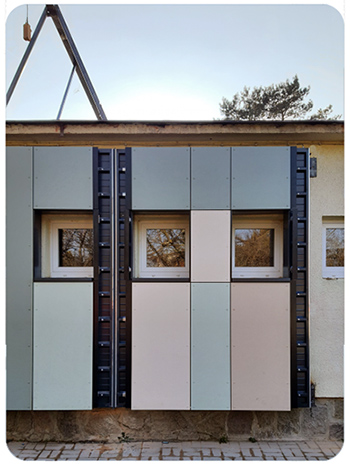The decarbonisation of existing buildings is one of the great challenges that the European Union has set for 2050, and which is included in the 'Renovation Wave' initiative. To work towards the European Union goals, the StepUP project develops affordable solutions and technologies aimed at transforming the energy renovation market and making the decarbonisation of existing buildings a reliable, attractive, and sustainable investment.
To this end, StepUP "offers a real opportunity to reach net zero emission buildings, by developing non-intrusive, quick and reliable deep renovation intervention tools that reduce installation time on site, minimise the risk of installation errors, and the inconveniences to occupants that deep renovations usually entail," underlines the coordinator of the project from Integrated Environmental Solutions Ltd, Amisha Panchal.
 Among StepUP deep renovation technologies, a novel plug & play façade has been developed with the capability to integrate windows and the necessary space for the facilities of the building conditioning systems. It consists of an extra layer for existing buildings composed by a thermo-insulating sandwich panel and an external layer available in a wide range of materials.
Among StepUP deep renovation technologies, a novel plug & play façade has been developed with the capability to integrate windows and the necessary space for the facilities of the building conditioning systems. It consists of an extra layer for existing buildings composed by a thermo-insulating sandwich panel and an external layer available in a wide range of materials.
"The structure is made up of a coldformed steel frame that supports mineral wool sandwich panels, varying both in height and width to adjust to the different existing façade configurations and facilitate its transport from the factory to the construction site," explains Ester Caldana, Architect at MANNI Group. "The outer layer of the ventilated façade can respond to a wide range of finishes, facilitating the customization of the intervention and providing an aesthetic improvement to the building," adds Caldana.
The plug & play façade envelope, currently being demonstrated in a kindergarten in the city of Budapest with poor energy performance, is interoperable and intercompatible with third-party solutions such as solar protection solutions, PV panels or heating and cooling systems, among others. To ensure that the StepUP solution is flexible enough, "we have developed a protocol defining the technical aspects needed to be followed for the integration of other decarbonisation solutions into the plug & play modules," explains David Masip, researcher at Eurecat Technology Centre.
The project also tackles the development of data intelligence solutions to make informed decisions in the design stage and to monitor the performance after implementation. In addition, it also offers financing models for the optimisation of energy, comfort, and cost performance over the life of the building.
In this sense, StepUP "addresses the European challenge of achieving the decarbonisation of existing buildings by 2050" in line with the Renovation Wave initiative, an objective "that will be effective only if cost-effective deep energy renovation technologies and integrated solutions are developed, a key action to reduce energy demand in buildings," says Panchal.
StepUP is made up of a consortium of nine partners from seven European countries, including two technology transfer institutions (Eurecat, Unismart), five industrial companies (IES Ltd and IES R&D, Manni Group, ABUD, Energinvest) and two owners and contractors (ACR and Municipality of 18th District of Budapest).